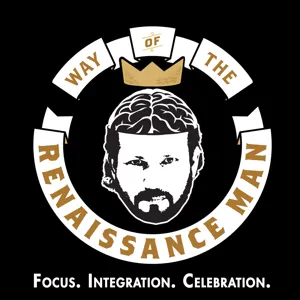Podcast Summary
Understanding the Human Soul through C.S. Lewis' Perspective: To make virtuous decisions, the head needs the aid of a well-developed chest, which can be educated through reading stories, rejecting chronological snobbery, and forming inspiring friendships.
According to C.S. Lewis, the human soul consists of three parts: the head, the belly, and the chest. The head represents rationality and reason, the belly represents appetites and base instincts, and the chest is the seat of virtue-seeking sentiments and well-tuned emotions. To make virtuous decisions instead of being driven by our base instincts, our head needs the aid of a well-developed chest. Professor Lou Marcos, an expert on C.S. Lewis, explained that the chest can be educated through three ways: reading stories and myths, rejecting chronological snobbery to learn from the past, and developing friendships that inspire excellence. Lou's personal connection to Lewis began in his youth when he was given Lewis' works as a gift during his conversion to Christianity. His academic career studying Lewis was sparked when he was approached to create a Great Courses lecture series on his literature criticism.
C.S. Lewis's Influence on Faith and Literature: C.S. Lewis, a renowned Irish author born in 1898, left a profound impact on faith and literature, inspiring countless individuals and scholars through his works in the Narnia series and apologetics, as well as his influence as an English professor.
C.S. Lewis, born in Ireland in 1898, has had a profound impact on various aspects of people's lives, including their faith and careers. His influence transcends denominational boundaries, and he is revered as a role model for many strong believers. As an English professor, Lewis has also been a significant influence on literature and education. His works, including those in the Narnia series and his apologetics, continue to be studied extensively in academic circles. Despite facing personal tragedies like the early death of his mother, Lewis's life and work were shaped by his deep connection to the Judeo-Christian and Greco-Roman traditions. His influence on literature and thought continues to be felt, with numerous scholars dedicating their research to his works.
C.S. Lewis's childhood experiences shaped his imagination and faith: Loss of mother, boarding schools, and war experiences influenced Lewis's rejection and later return to faith
C.S. Lewis's Irish upbringing and experiences, including the loss of his mother and his service in World War I, significantly influenced his imagination, his rejection of faith, and later, his return to it. Growing up in Ireland with an imaginative environment and a strong bond with his mother set the foundation for his creativity. However, the devastating loss of his mother and the harsh experiences of boarding schools pushed him away from his faith and towards atheism. His service in World War I further shaped his worldview, instilling a sense of camaraderie and highlighting the existence of evil in the world. Despite his early rejection of faith, the seeds of his religious beliefs were planted during his childhood and eventually bore fruit in his later life.
Oxford education shaped C.S. Lewis: C.S. Lewis's rigorous Oxford training in languages, logic, and philosophy, under the influence of a skeptical atheist tutor and a committed Catholic friend, J.R.R. Tolkien, shaped his unique perspective and made him a formidable apologist and inspiring writer
C.S. Lewis's experiences and education at Oxford, despite his struggles with math, played a significant role in shaping him into one of the most influential thinkers of the 20th century. His rigorous training in languages, logic, and philosophy under the guidance of both a skeptical atheist tutor and a committed Catholic friend, J.R.R. Tolkien, allowed him to develop a unique perspective that informed both his literary works and philosophical ideas. Lewis's ability to integrate logic and reason with creativity and imagination, rooted in his deep love for language and literature, made him a formidable apologist and a writer whose works continue to inspire and challenge readers.
C.S. Lewis and J.R.R. Tolkien's Deep Friendship and Mythological Discussions: Lewis and Tolkien's shared love for mythology and literature led to profound discussions about courage, duty, and responsibility. A fateful night on Addison's Walk changed Lewis's perspective on Jesus, leading him to embrace Christianity.
C.S. Lewis's friendship with J.R.R. Tolkien was deeply influenced by their shared love for mythology and literature. They formed a club called the Kolbitars to read Norse sagas in the original Old Norse, and their discussions centered around themes of courage, duty, and responsibility. However, Lewis's belief system was still evolving. He was drawn to the archetypal character of the Corn King, a mythological figure whose cycle of life, death, and rebirth gave fruition to the earth. Lewis assumed that Jesus was just another version of this myth. One fateful night on Addison's Walk in Oxford, Tolkien challenged Lewis's perspective by suggesting that perhaps Jesus was the myth that became fact. This revelation led Lewis to embrace Jesus as Lord and Savior a week later. This encounter marked a significant turning point in Lewis's life and had a profound impact on the 20th century.
C.S. Lewis and the Universal Moral Order: C.S. Lewis emphasized the importance of adhering to a universal moral order, which he called the Tao or the moral law, to remain human. His works invite us to explore the connection between faith, myth, and ethics, and recognize the inherent moral order that shapes our humanity.
C.S. Lewis believed that Jesus, as the Savior of the world, fulfilled not only the Old Testament law and prophets but also the deepest yearnings of pagans. This idea, as expressed in Lewis's literary works, allowed him to rediscover his love for myth, story, and virtue. In both the Christian and universal contexts, Lewis emphasized the importance of adhering to a universal moral order, which he called the Tao or the moral law, to remain human. He argued that the Nuremberg trials, held even in a secular and liberal Europe, demonstrated the acceptance of this moral order and the understanding that those who violated it knew they were doing wrong. Lewis's works, therefore, invite us to explore the connection between faith, myth, and ethics, and to recognize the inherent moral order that shapes our humanity.
Building a Strong Chest: Courage and Virtuous Actions: Storytelling of brave heroes helps children develop courage and virtues, strengthening their rational side against base instincts.
The "tau," or how we expect others to treat us, exists and influences our actions. However, our lower passions and instincts often win over rational thinking. To overcome this, we need to engage our virtuous side, represented by the chest in Plato's analogy. This is where our stories of heroism and virtuous actions reside. By telling children stories of brave heroes, we can help build their chests and teach them the importance of courage and virtuous actions. Without this, our rational side may be overwhelmed by our base instincts. C.S. Lewis' works, such as the Chronicles of Narnia, provide excellent examples of child heroes learning the importance of courage and making amends for their mistakes.
Using stories to teach virtues: C.S. Lewis used stories in his children's books to teach virtues and instill good values, like courage and selflessness, in readers.
That C.S. Lewis used stories, specifically in his children's books like Narnia, to teach virtues and instill good values in readers. In the story of Diggory and the White Witch, Diggory shows courage and virtue by choosing to do what is right, even if it means denying himself the temptation of eternal youth and healing for his mother. This is an example of Lewis's use of stories to educate the "chest" or the emotional and intuitive side of people, in addition to their rational and logical side. Throughout history, stories have been effective in teaching moral lessons, and Lewis understood this when he chose to write children's stories instead of philosophical treatises. By telling stories of virtues and vices, readers can learn to embrace the good and avoid the bad, making stories an effective tool for character development and moral education.
Challenging the perception of children's literature: C.S. Lewis and J.R.R. Tolkien's works, rooted in history, broadened perspectives and reminded us of timeless values
C.S. Lewis and J.R.R. Tolkien, through their storytelling and literature, challenged the perception that children's literature was inferior and brought it back to being a respected literary genre. Their deep understanding of history, particularly medieval history, played a significant role in their ideas about education and the importance of looking to the past. They believed that by learning from the past, we can broaden our perspectives and remember what we may have forgotten. Their works, filled with courage, duty, and a deep appreciation for the past, serve as reminders of values that are still relevant today, despite our modern tendencies to demonize the past and believe that newer is always better.
Learning from the Past with Humility and Open-mindedness: Embrace the wisdom of the past by engaging with primary texts and cultivating strong friendships to broaden horizons and enrich personal growth
S. Lewis's perspective on education is the importance of learning from the past with humility and open-mindedness. He believed that understanding the values and traditions of earlier civilizations, such as the Middle Ages, could enrich our modern lives. The medieval world held a deep respect for the sacredness of time, traditions, and knowledge, which we have largely lost in our modern, secular society. To counteract this "chronological snobbery," Lewis encouraged readers to put themselves in the shoes of the past and engage with primary texts, rather than merely studying them from a critical or superior perspective. He also emphasized the role of friendship in education, as he and J.R.R. Tolkien were known for promoting the value of deep, meaningful relationships. By embracing the wisdom of the past and cultivating strong friendships, we can broaden our horizons and enrich our own personal growth.
The Importance of Friendship in Ancient and Medieval Societies: Friendship sets us apart from animals and raises us closer to angels, fostering communities that support beliefs and values, as emphasized by C.S. Lewis and the Inklings.
Friendship, according to C.S. Lewis and other ancient philosophers like Aristotle, holds great importance and value in human life. It sets us apart from animals and raises us closer to the angels. Despite the modern focus on romantic and erotic love, friendship was highly regarded in ancient and medieval societies. The Inklings, a literary group consisting of Christians like Lewis and J.R.R. Tolkien, emphasized the importance of friendship in their writing and creative processes. They encouraged each other through tough criticism, fostering a community that supported their beliefs and values. To learn more about this concept and other ideas related to virtue, creativity, and literature, check out Louis Marcos' work, available on Amazon and his YouTube channel. It's essential to rediscover the value of friendship and build communities that can be a positive influence on our local communities and the world.
Exploring CS Lewis' Impact on Literature and Philosophy: CS Lewis, known for his Chronicles of Narnia series, also made significant contributions to philosophy through works like 'Mere Christianity'. His enduring influence continues to shape literature and thought.
The profound impact of CS Lewis on literature and philosophy. Our guest, Louis Marcos, shared his extensive knowledge on CS Lewis' life and works through his books and the Great Courses course. CS Lewis' influence extends beyond his famous Chronicles of Narnia series, as he also wrote deeply philosophical works like "Mere Christianity." By examining his life and ideas, we can gain a better understanding of his enduring legacy. To learn more, check out the resources in our show notes at AOM.io/educatingthechest. Remember, the goal is not just to listen, but to put the insights gained into action. Thanks for tuning in, and we'll see you next time on the A1 Podcast.













